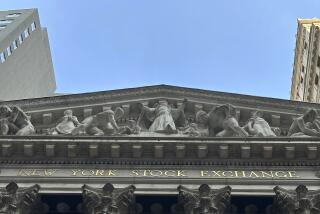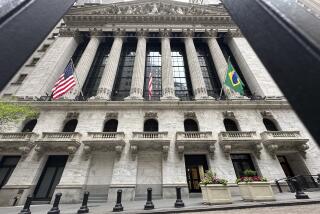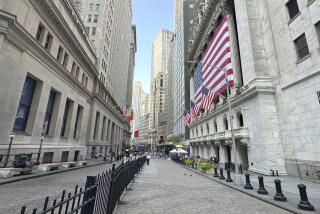Attack Rubble Obscures View of Bottom Line
NEW YORK â Like the dust and smoke that shrouded lower Manhattan after the attack on the World Trade Center, the events of Sept. 11 are obscuring the profit outlook for U.S. corporations.
There is no doubt that the quarter just ended will mark the fourth straight period of earnings declines for companies in the blue-chip Standard & Poorâs 500 as a whole, extending the worst earnings recession in at least a decade. And there is no doubt that the terrorist attacks made things even worse.
The real question is how to separate the effects of the attacks from those of the severe economic crunch that already was well underway.
Itâs an issue of concern to investors as well as accountants. Investors need to know whether the companies whose stocks and bonds they own have suffered long-term damage to their earnings power or just a glancing blow from which they quickly can recover.
The Financial Accounting Standards Board, the top umpire for corporate bookkeeping, tackled the topic in a controversial Sept. 28 ruling that barred companies from setting aside losses related to the terrorist attacks as one-time âextraordinaryâ items on their financial statements.
Instead, FASB told firms to treat such misfortune as part of the bumps and bruises of ordinary operations.
âIf you lived in Lebanon, this would be a part of normal business, and Iâm sorry to say, this is business in America now,â said Howard Silverblatt, quantitative-services editor for S&P; and an expert on corporate earnings.
From Sept. 11 forward, he noted, companies as a matter of course will spend more on security and backup work sites and will prepare more thoroughly for sudden disruptions that can choke off sales or raise costs.
But other experts worry that by refusing to let companies segregate their terrorism-related costs, the accounting arbiters at FASB may have encouraged firms to bury all kinds of problems in the financial rubble that the attacks left behind.
Firms whose earnings would have looked pitiful in any case may count on investors and Wall Street analysts just throwing up their hands at the confusion and ignoring the third quarter and perhaps the fourth quarter as well. If companies get such a free pass, this line of thinking goes, some will take advantage by writing off as many expenses and unusual items as possible.
âYou canât sort out whatâs what, so theyâll try to blame everything on this attack,â said Charles L. Hill, research director for earnings-tracker Thomson Financial/First Call in Boston.
Pain of Downturn Now Spread Differently
The attacks came while financial seers were hotly debating when an economic turnaround would come. After Sept. 11, a kind of consensus emerged: Now it will take longer.
It is also clear that the pain of the downturn will be distributed differently because of the attacks. The transportation and lodging industries--for two obvious examples--will suffer more than they probably would have in an ordinary economic slump.
One of the firms that figures to be hardest hit by the disaster--No. 1 hotelier Marriott International Inc.--reported third-quarter earnings last week, but for the fiscal quarter that ended Sept. 7.
The entire industry has been slammed by the attacks, but Marriott may have been uniquely affected in that it lost a hotel facing the World Trade Center and two of its employees were among the missing.
Marriott was able to give only sketchy guidance about its current quarter--the one that includes Sept. 11--but the information it did reveal was harrowing. Revenue per available room, a common performance measure, plunged 49% from a year earlier at Marriott-operated U.S. hotels during the two weeks ended Sept. 28.
Hill of First Call thought the number of earnings warnings from U.S. companies might have subsided later this year if it hadnât been for the attacks.
âIf we were hoping for first-quarter [2002] earnings improvements, we needed to see a slowing [of warnings] by the third quarter,â Hill said. But in the aftermath of the terrorist attacks, he said, âweâre back very close to a record.â
As the number of negative corporate preannouncements mounts, analysts continue to mark down their estimates for the fourth quarter and the first quarter of 2002, Hill said.
On Sept. 10, the consensus estimate for the full S&P; 500 was for a fourth-quarter earnings decline of 2.6% from a year earlier. As of Friday, however, analysts had revised that down to minus 10.5%.
And what had been projected on Sept. 10 as a 8.2% gain for next yearâs first quarter now is a far dicier proposition. As of Friday, the First Call consensus among analysts was for a mere 0.7% gain, and given the trend, that probably will erode into a decline before long, Hill said.
As for the sectors expected to lose the most ground, the transportation industry has taken over the crown from technology. Because of the drop in airline bookings that has followed the attacks, analysts surveyed by First Call are expecting a sea of red ink from airlines in the third quarter.
As of Sept. 10, by contrast, analysts were forecasting a 61% shrinkage in S&P; transportation sector profits from a year earlier, but many firms still were expected to be profitable.
S&P; tech sector third-quarter earnings are expected to be off 71% from a year earlier, only a slight change from the minus 68% estimate of Sept. 10.
The basic materials, consumer cyclical and energy sectors--all of which tend to rise and fall with the economy, also are expected to post double-digit earnings declines for the third quarter, as is the communication-services sector, still reeling from the Internet bust.
The lone bright spots among S&P;âs 11 industry sectors are health care and utilities, expected to record gains of 11% and 7% respectively, according to First Call.
Robert Olstein, a value-oriented money manager in Purchase, N.Y., said he is barely paying attention to earnings for the rest of this year because he considers the period a washout. Olstein thinks it may be the second half of next year before the fiscal-stimulus package being prepared by Congress, plus the campaign of interest-rate cuts orchestrated by the Federal Reserve Board, finally will bear fruit.
The stock market traditionally begins rising four to six months ahead of an economic rebound, but this process doesnât happen by magic: Wall Street takes its cues from earnings reports and other company statements that reveal clues about the business climate. Thatâs why clarity in financial reporting is so crucial.
The bulk of third-quarter earnings reports are yet to come--only 34 of the S&P; 500 firms had reported as of Friday. Sixteen will arrive this week and then the real flood begins, with 190 next week and about 150 the week after that, according to First Call.
Next Few Weeks to Reveal the Damage
These few weeks will better reveal how corporate America is dealing with the attacks. By the time FASB made its ruling, some companies already had begun making some dubious attempts to link their earnings woes to the World Trade Center disaster.
Florida-based grocery chain Winn-Dixie Stores Inc., for one, slashed its quarterly profit forecast by more than one-third, partly blaming âgeneral business and economic uncertainties arising from the tragic events of Sept. 11.â
Some analysts criticized the move, noting that Winn-Dixie has no stores in New York or Washington, where the attacks occurred. Moreover, the companyâs fiscal quarter ended Sept. 19--meaning that only eight days of business could have been affected.
In another example, insurer Conseco Inc. announced last week a $475-million writedown of junk bonds and other securities. Chairman Gary Wendt led an explanatory letter to shareholders by saying: âThe terrorist attacks on Sept. 11 took a slow quarter for the American economy and made a bad situation worse.â
Burden on Firms to Prove Hardship
Noting that the Conseco portfolio had been going sour for some time, bond analyst Kathy Shanley of Wilmette, Ill., research firm Gimme Credit, said: âIt is cynical at best to lay this particular disaster at the feet of Osama bin Laden.â
FASB has no control over what companies tell analysts or how they spin their earnings results in news releases, noted Lawrence Revsine, accounting professor at Northwestern University.
But by keeping firms from reporting the attacks as an extraordinary event in their official quarterly filings with the Securities and Exchange Commission, FASB put the burden on the companies to explain--with as many additional facts and figures as necessary--why they feel Wall Street should give them a break.
Itâs not always a companyâs fault when things go wrong; sometimes there really are extenuating circumstances, Revsine said, but at least firms should be forced make the case.
âIf they think they were affected [by the attacks], theyâre going to have to sell it--and that means detailed disclosure,â Revsine said.
It also means that there will continue to be a sharp divergence between what S&P; calls âas-reported earningsâ and âoperating earnings.â As-reported earnings are the official profit numbers, before allowable--and generally rare--extraordinary items such as one-time charges for plant closures, changes in accounting methodology or discontinued operations.
Operating earnings, in S&P;âs parlance, also are known as âpro formaâ earnings. They are what companies tell Wall Street they would have earned if it hadnât been for certain unusual expenses or other unforeseen glitches that donât meet FASBâs definition of extraordinary. This is where subjectivity comes into play and where investors can expect to see estimates of the effects of the terrorist attacks.
Accounting wags have coined a nickname for the category: EBBS, or Earnings Before Bad Stuff.
âSome companies wish they could [say]: âThis is what we planned to do this quarter before this other stuff came up,â â said Mark Bradshaw, a Harvard Business School professor who has studied the growing trend of firms reporting pro forma earnings alongside their official numbers.
The difference can be significant. Average as-reported earnings for the S&P; 500 were $4.83 per index share in the second quarter, compared with operating earnings of $9.02 per share.
The 46.5% disparity is a record going back at least to 1988, but Silverblatt said it could easily be topped as third-quarter earnings reports trickle in and the effects of the World Trade Center attacks are reported.
The increasing use of pro forma earnings has been troubling financial regulators for years. Former SEC Chairman Arthur Levitt attacked the practice repeatedly during his tenure, using his position as a pulpit from which to educate investors about bookkeeping trickery.
FASB, too, has said it will address pro forma reporting in a broad rule-making project underway.
To illustrate how the situation has changed in recent years, Bradshaw pointed out that when the Persian Gulf War caused oil prices to skyrocket in the early 1990s, airlines âwouldnât have dreamedâ of issuing statements about how their earnings would have looked with lower jet-fuel costs.
More to Read
Inside the business of entertainment
The Wide Shot brings you news, analysis and insights on everything from streaming wars to production â and what it all means for the future.
You may occasionally receive promotional content from the Los Angeles Times.










